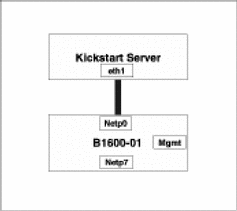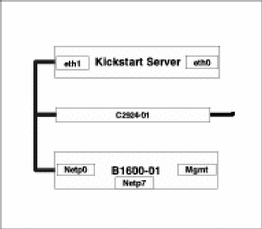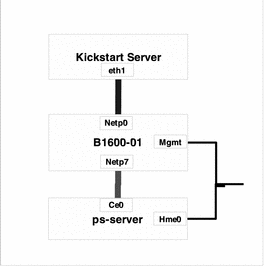Setup and Physical Connections
The Kickstart server can be networked into the N1 Provisioning Server setup in several ways. The following illustrations depict two of those possibilities.
In the scenario illustrated by Figure 4–1, one of the Ethernet interfaces (if the machine has more than one) of the Kickstart server is connected directly to one of the available ports on the blade shelf. In this example, the NETP0 port is used.
Figure 4–1 Kickstart Server Attached Directly to Shelf

Another possibility, as depicted in Figure 4–2, is that the Kickstart server is connected to the blade shelf via an external switch. In the figure, the interface eth1 of the Kickstart server is connected to a Cisco switch C2924. One of the external ports of the shelf, in this case, NETP0, is also connected to the switch C2924.
Figure 4–2 Kickstart Server Attached to Shelf Through Switch

The rest of the document assumes the setup shown in Figure 4–3, in which the connections with the Provisioning Server machine are included. Note that the setup is based on the one described in Figure 4–1. The Kickstart server can be reached from an external network by using a second Ethernet interface if one exists or via terminal server (if one is configured). Alternatively, the Kickstart server can be accessed directly through its console device (monitor) if one is available. The interface connected to the shelf must be plumbed and assigned a valid Internet address.
Figure 4–3 Typical Kickstart Server Setup in N1 Provisioning Server Environment

Example 4–1 Sample Kickstart Server Configuration
The following is an example of the network configuration of the Kickstart server.
[root@ks-server root]# ifconfig -a
eth0 Link encap:Ethernet HWaddr 00:03:47:31:71:98
inet addr:10.5.140.151 Bcast:10.5.140.159 Mask:255.255.255.240
UP BROADCAST RUNNING MULTICAST MTU:1500 Metric:1
RX packets:134432 errors:0 dropped:0 overruns:0 frame:0
TX packets:114431 errors:0 dropped:0 overruns:0 carrier:0
collisions:0 txqueuelen:100
RX bytes:31829037 (30.3 Mb) TX bytes:45777133 (43.6 Mb)
Interrupt:10 Base address:0xc000
eth1 Link encap:Ethernet HWaddr 00:03:47:31:71:99
inet addr:10.40.40.1 Bcast:10.40.40.255 Mask:255.255.255.0
UP BROADCAST RUNNING MULTICAST MTU:1500 Metric:1
RX packets:321940 errors:0 dropped:0 overruns:0 frame:0
TX packets:1540859 errors:0 dropped:0 overruns:0 carrier:0
collisions:0 txqueuelen:100
RX bytes:48545214 (46.2 Mb) TX bytes:2160671329 (2060.5 Mb)
Interrupt:5 Base address:0xe000
lo Link encap:Local Loopback
inet addr:127.0.0.1 Mask:255.0.0.0
UP LOOPBACK RUNNING MTU:16436 Metric:1
RX packets:538 errors:0 dropped:0 overruns:0 frame:0
TX packets:538 errors:0 dropped:0 overruns:0 carrier:0
collisions:0 txqueuelen:0
RX bytes:42254 (41.2 Kb) TX bytes:42254 (41.2 Kb)
[root@ks-server root]#
|
The first interface (eth0) of the server is connected to an external switch. The server is accessible through this interface. The second interface (eth1) is connected directly to the shelf and assigned an IP address of 10.40.40.1 in the 10.40.40.0 network.
- © 2010, Oracle Corporation and/or its affiliates
